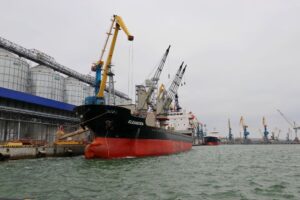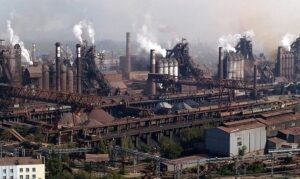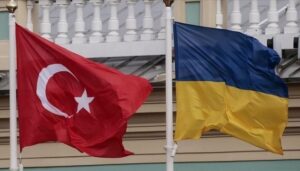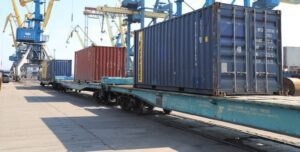
The Mariupol Investment Group (MIG, UTA Group), which owned the UkrTransAgro sea terminal in Mariupol before the Russian military invasion, has resumed trading agricultural products through the Danube ports.
The grain trader in the current 2022/2023 marketing year (MY, July-June) has already shipped 3.14 thousand tons of wheat on barges, according to the organization’s Facebook page.
“For our company, this is an important event, since we are returning to business after losing access to the territories and the terminal itself in Mariupol (…) Now we are at the stage of formation and improvement of business processes, which will allow us to reach the design capacity for shipping up to 15 thousand tons per month. We hope that soon we will gather our former team of specialists, who are now in different parts of Ukraine,” UTA Group quotes its head Pavel Plotnikov.
The company clarified that in July this year it rented a granary with a capacity of 5 thousand tons in order to accumulate agricultural products for further export, while in the first month of operation it processed a total of 5.5 thousand tons of wheat.
As reported, the marine terminal of UkrTransAgro LLC (Mariupol, Donetsk region), which is part of the Mariupol Investment Group (MIG, UTA Group), stopped working immediately after the Russian military invasion of Ukraine on February 24.
UkrTransAgro LLC and UTA Logistic LLC are part of MIG, founded in 2007 by Oleksandr Savchuk to consolidate assets. Later, Savchuk divided the management of the main (Azovmash group) and promising (MIG) business areas.
In 2010 MIG was transformed into the management company “Mariupol Investment Group”.
MIG manages the Azov Shipyard, UkrTransAgro LLC, UTA Logistic LLC, Maritime Logistics LLC, Martlet LLC, TRK TV-7 LLC.
Transshipment of grain and oilseeds through the sea terminal of UkrTransAgro LLC in 2020/2021 MY decreased by 39% compared to 2019/2020 MY – to 430 thousand tons from 711 thousand tons.
AGRICULTURAL PRODUCTS, Danube, INVESTMENT GROUP, MARIUPOL, PORTS

A film about Mariupol, shot by Lithuanian documentary filmmaker Mantas Kvedaravičius, won the Golden Eye Special Jury Prize at the Cannes Film Festival, the press service of the Verkhovna Rada reports.
“The documentary “Mariupoli 2″ was edited from material that the Lithuanian director Mantas Kvedaravičius filmed before his death. He arrived in Mariupol in March and filmed the lives of civilians. Then he died,” the message on the telegram channel says.
The jury of the Cannes Film Festival noted the film as “very radical, courageous, artistic and existential” and emphasized that it cannot be compared with any other film in the competition.
As reported, the Lithuanian documentary filmmaker Kvedaravichyus died in Mariupol (Donetsk region) on April 2. He is the author of the film “Mariupoli” released in 2016 about life in front-line Mariupol, which was presented at the Berlin International Film Festival.
CANNES FILM FESTIVAL, DOCUMENTARY FILM, MARIUPOL, SPECIAL PRIZE

LLC “Zaporozhye Casting and Mechanical Plant” (ZLMZ), created on the basis of the production workshops of the department of the chief mechanic of PJSC “Zaporizhstal”, which is part of the Metinvest group, has resumed its work.
According to the company’s information on Sunday, earlier the Metinvest group decided to withdraw the main equipment of ZLMZ from the conservation regime, while before that only duty teams came to the workplace to maintain the equipment in proper condition.
“We have every reason to resume work: the military situation in Zaporozhye is under control, we have received both standard orders and unique requests from customers, so now we are making every effort to fulfill them,” the words of the acting are quoted in the message. Director General of ZLMZ Igor Dolgozvezda.
It is specified that the plant has resumed the work of the main divisions: a mechanical workshop, a metal structure workshop and a section for the production of shaped castings. Currently, the Zaporizhia Casting and Mechanical Plant is planning to produce and restore parts for Metinvest enterprises – Zaporizhstal, Kametstal, Metinvest Pokrovskugol and mining and processing plants of the Metinvest group. The company is also mastering the production of new types of products – spare parts for mining and lifting vehicles.
Yury Dmitriev, the head of the ZLMZ machine shop, pointed out that after the information about the resumption of production, the workers immediately expressed a desire to return to work, and some employees even began to return from abroad.
“Before the war, we worked on a day/night/48 or 5/2 schedule. Now our workers are ready to work around the clock to load the equipment to the maximum and produce the maximum product,” Dmitriev said.
Work shifts for employees have been adjusted to reflect the curfew. The enterprise provides centralized transportation of workers by corporate transport.
According to the decision of the company, the priority right to employment for open vacancies of scarce professions at ZLMZ is granted to specialists evacuated from Mariupol to Zaporozhye.
It is indicated that the company is gaining pre-war momentum and even working on new technologies so as not to depend on foreign supplies.
The press service also reports that ZLMZ employees, as volunteers, joined the work of the Center for the Coordination of the Humanitarian Mission of Metinvest in Zaporozhye from the first days of its creation, taking part in the reception, sorting and formation of cargo with humanitarian aid and coordinating the reception of internally displaced persons at social facilities companies in Zaporozhye.
LLC “Zaporozhye Casting and Mechanical Plant” (ZLMZ) was established on the basis of the foundry and mechanical shops, as well as the shop of metal structures of the plant “Zaporizhstal” in mid-2016. At the same time, the steel plant remains the main partner of the plant, which is a diversified enterprise with a closed production cycle.
ZLMZ specializes in the production of castings from cast iron, as well as from alloyed, low-alloyed and high-alloyed steels, metal structures and metal parts. The company produces a wide range of products, which includes molds for metallurgical plants, building structures, spare parts and prefabricated assemblies. The main consumers of the plant’s products are enterprises of the mining and metallurgical and other industries.
The plant is part of the Metinvest group, the largest mining and metallurgical holding in Ukraine. The main shareholders of Metinvest are the SCM group (71.25%) of Rinat Akhmetov and Smart Holding (23.75%) of Vadim Novinsky, who jointly manage the company.

Turkey is ready to provide ships to organize the evacuation of civilians and the wounded from Mariupol by sea, Turkish National Defense Minister Hulusi Akar said on Saturday, Anadolu Agency reported.
“Ankara’s readiness to support the evacuation process was brought to the attention of the Russian military attaché in Turkey, who was invited to our defense department. A similar initiative was transferred to Russian authorities and through the Turkish military attaché in Moscow. We are also coordinating our efforts with Ukrainian authorities through the military attaché in this country,” Akar said.
Akar also noted that Turkey continues to supply humanitarian aid to the Ukrainian people.
The Turkish minister announced active contacts with the Russian Federation and Ukraine and on the issue of the safe exit of Turkish ships from Ukrainian ports.
Regarding the mine threat in the Black Sea, the minister noted that at the moment there are no problems for shipping.

A modern container terminal could be built in the port of Mariupol (Donetsk region) on the territory of the former coal-loading complex, Ihor Barsky, the head of Mariupol seaport.
“In the long term, we have a dream: to turn the territory of the former coal loading complex of the seaport into a modern container terminal,” he said during the NewPort international exhibition in Kyiv.
Barsky recalled that since 2015, the container flow in the Sea of Azov has been completely stopped. Container lines stopped making calls to Azov after the imposition of European and American sanctions on Crimea.
“Now we are working to return container traffic to Azov. We are supported in this issue by the city, the region, the Ministry of Infrastructure. This is a difficult task, but solvable,” he said.
According to him, at present the port has pre-design studies of this terminal, in the future a feasibility study will be ordered.
“Now we are liquidating the loading complex, selling the equipment that is there, and preparing this serious investment site. How much it will cost – I can’t say yet. We can talk about this when the feasibility study is completed,” Barsky summed up.